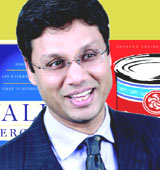|
Executive Interviews: Interview with Nirmalya Kumar on Private Labels
April 2008
-
By Dr. Nagendra V Chowdary
 Nirmalya Kumar
Nirmalya Kumar Professor of marketing, Faculty Director for Executive Education, Director of Centre for Marketing, Co-Director of Aditya Birla India Centre at London Business School. 
Do you find majorly nonbusiness
factors playing bigger role
than just the business factors?
The biggest non-business factor
playing amajor role in retailing is real
estate. Getting real estate in any
country and getting the permission to
open big stores is a challenge. For big
stores, if you want to go for real estate
is a huge issue because it is not easy
to get permission to start. InUK today,
to start a big store, from the time you
think about big store and the day it
opens will be 10 years. If at all the manufacturer brands
have to ompliment these people to
be really
|
|
csuccessful. Do you have
any examples where manufacturer
brands actually compete with them
and they were successful?
This is a very good question and also
a very important question. We are
very clear in our book saying, 10 years
from today the share of private labels
overall will be higher than today,
nothingwill stop that,worldwide. But
it doesn'tmean in any category, in any
given country a manufacturing brand
can't beat a private label. In general,
private labels will be higher, but
specifically within any category in
any country, manufacturer brand can
beat. But the manufacturer brands,
this is what we show in one of our
chapters very well, the manufacturer
brands when they win against private
labels, generally the private label share doesn't go down. The share of
the manufacturer brand number two,
three, four goes down. What we are showing in our book
is that a manufacturer brands
increased share in a category,
generally other manufacturer brands
will loose not private labels. What if actually somebodywants
to preempt all these just to get
manufacturer brands commit
resources in an attempt to fool the
competition?
There is no doubt. By having a private
label in a category you do make
manufacturer to commit resources to
you. The way you make money in
private label is, the margin in private
labels are larger than manufacturer
brands, so you make money that way.
Number two. You make money
because you control your own
destiny. Number three. You make
money because once you have private
label in the category the manufacture
brands give you more money. In private labels, does the
customization play a big role, in
case if you are really looking for
economies of scale.
In one placewhere private label create
lot of value is in doing things which
manufacturer brands can't do. One of
the place that is very true is fresh
foods and prepared foods. Because
manufacturer brands have to do it in a
factory somewhere and distribute,
whereas retailers has shop, so they
can domore customization. Generally
you find in fresh food, fresh fruit,
fresh flowers, manufacturer brands are not as powerful as retailer brands
as they havemore ability to customize
and more ability to bring freshness at
the point of sale. Whereas, the
manufacturer supply chain by
definition will bemuch longer so they
can't give the same level of freshness
as the retailers supply chain do. How do you see the future of this
one across the globe, may be 20
years down the line?
Twenty years down the line, I think
private labels today is about 25% of
the worldwide share. Twenty years
from now, probably 40%. What would definitely happen to
or may be possibly happen to really
established retailers?
Retail is a very competitive business.
Retailers keep getting into problems.
Retailers never have a smooth
transition always going. In retail, we
have transition growing and formula
gets upgraded and you need to
change the formula and you have
tough time making the transition.
Every retailer who has been down for
a longtime has also gone through a
transitional phase. Because at some
stage the formula, which made you
successful, becomes old and new
formulas come in which are better
and then you have to revamp.
Whether you are Marks & Spencers,
Kmart, Tesco, you always have to go
back and recoup the formula. If you have to pitch on one Indian
Retail Company, which has a
capacity to go global andmakemark
for itself, which one it would be?
None, that's it. None of them has
shown me any capability that they
have global mark. If you have to rate five skills or
capabilities, that they have to
develop, what they would be?
Number one, skill has to be on
logistics, you cannot be a great mass
retailer without having logistical
capabilities. Number two is IT. You
can't manage 5000 stores without
great IT systems.
1.
Private Labels Case Study
2. ICMR
Case Collection
3.
Case Study Volumes
|
